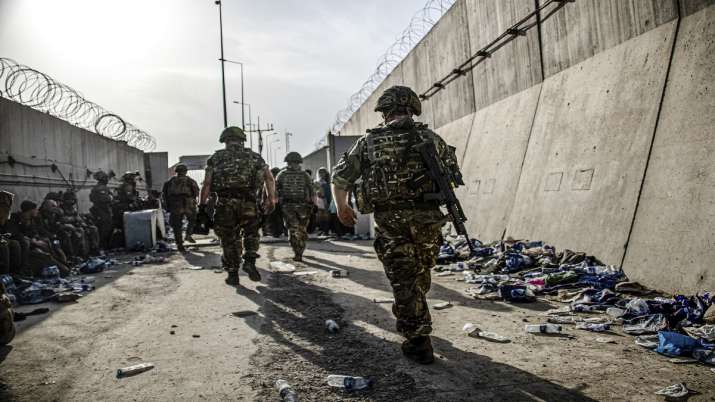
Britain struggles for influence as Afghan crisis ravages US ties
The chaotic withdrawal of Western military forces from Afghanistan and the country’s rapid takeover by the Taliban has stunned UK officials and strained Britain’s “special relationship” with its most important ally, the United States.
London’s impotence, so far as Washington’s course to change, is a blow to Britain’s hopes that an outspoken “Global Britain” will be a major global player once it leaves the EU.
The main hurdle ahead of an emergency summit of the Group of Seven leaders on Tuesday is the deadline for a US effort to evacuate thousands of Americans, Afghans and others from Kabul. US troops are due to end their mission on August 31, and Britain seeks expansion.
President Joe Biden left that possibility open, but the Taliban called the date a “red line,” adding that prolonging the US presence “will provoke a backlash.”
Prime Minister Boris Johnson has spoken to Biden only once in recent weeks – two days after the Taliban captured Kabul – and convened a virtual G-7 meeting in hopes of having some effect on the chaotic course of events. Britain currently presides over the Club of the Wealthy Countries.
British officials acknowledged the extent of their influence, saying that the airlift would end when American troops left.
“We have previously talked to other NATO countries about staying, and that did not prove to be a viable option,” Johnson’s spokesman Max Blaine said.
“We need to leave the airport along with the Americans.” Defense Secretary Ben Wallace, who called the US deal with the Taliban a “mistake” setting the August 31 deadline, said in an almost pleading tone that if Biden extended the operation “even for a day or two, he would He will give us another day or two to evacuate the people.”
“Because we’re really down for hours now, not weeks, and we have to make sure we take advantage of every minute to get people out.”
About 1,000 British troops are stationed at Kabul’s airport, along with about 6,000 American troops, to manage the evacuation. Senior UK military officials have expressed anger at the US withdrawal from Afghanistan, saying it exposed the hollowness of the trans-Atlantic “special relationship” – a phrase used since World War II. emphasizes the bond of history, friendship and shared diplomatic interests between and Washington.
More than 150,000 British soldiers served in Afghanistan in the years following the US-led 2001 invasion – the largest contingent after the Americans – and 457 died in the campaign.
Biden had heated words about the alliance when they first met at the G-7 summit in England in June.
“We reaffirmed the special relationship — this is not to be said lightly — the special relationship between our people,” Biden said.
Though the two leaders spoke in a positive tone during the meeting, their nature is very different. Biden strongly opposed Britain’s exit from the European Union, which was championed by the populist, crowd-pleasing Johnson, and once called him a “physical and emotional clone” of former President Donald Trump.
Britain’s lack of clout with Washington underscores the fragility of Johnson’s goal of making “Global Britain” a major international player and a bridge between the US and Europe after Brexit.
Leaders across Europe were relieved when Biden replaced Trump, a separatist who has repeatedly insulted NATO and America’s allies. Biden renewed US commitment to global climate change goals, which Trump broke, and reassured allies that the US is back as a reliable partner.
But he has stuck to Trump’s commitment to ending the US war in Afghanistan, even as the pace of the Taliban takeover this month surprised Washington and its allies.
Opponents say Johnson’s reluctance to work closely with the EU and his decision to reduce Britain’s foreign aid budget, citing the economic blow of the pandemic, makes “Global Britain” little more than a slogan .
And they accuse the government of a slow and disorderly response to the Afghanistan crisis. Foreign Secretary Dominic Raab was on vacation in Greece as the Taliban marched towards the Afghan capital, returning a day after the fall of Kabul on August 15.
Johnson spoke to Biden by phone on August 17, two days after the fall of Kabul. In a soft statement after the call, Johnson’s office said they “resolved to continue working together on this over the coming days and weeks to allow as many people as possible to leave the country.” British media reported that it took Biden 36 hours to return the call from the British leader.
Britain’s Armed Forces Minister James Happy acknowledged Britain would prefer a US withdrawal “based on more terms”, but insisted the special relationship remained strong.
He told Sky News, “Of course it hurts when you disagree with your best friend, it creates hindrances on both sides of the relationship. But no one should think that the deep-seated relationship between the US and the UK.” And strong relationships are anything but.” Thomas Gift, director of the Center on US Politics at University College London, said that events in Afghanistan “will make other Western powers more firmly aware of the reality that, even under Biden, the US leadership will pursue policies that will He looks after his own interest, regardless of criticism by the international community.”
But he said Biden remained far more of an international team player than Trump.
“What we are seeing here is not just America First, let alone a diluted version of America’s foreign policy,” he said. “We’re seeing Biden on one issue – granted, a hugely important one – reach a different conclusion than many other global leaders.”
Read also | Afghanistan crisis: Kabul airport suspends operations until further notice
Read also | Taliban warns of ‘consequences’ if extension of August 31 deadline for US-led troop withdrawal
.